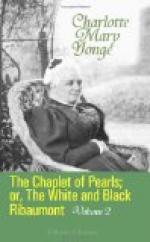He conducted her across a great tapestry-hung saloon, where twelve or fourteen ladies of all ages—from seventy to fifteen—sat at work: some at tapestry, some spinning, some making coarse garments for the poor. A great throne-like chair, with a canopy over it, a footstool, a desk and a small table before it, was vacant, and the work—a poor child’s knitted cap—laid down; but an elderly minister, seated at a carved desk, had not discontinued reading from a great black book, and did not even cease while the strangers crossed the room, merely making a slight inclination with his head, while the ladies half rose, rustled a slight reverence with their black, gray or russet skirts, but hardly lifted their eyes. Eustacie thought the Louvre had never been half so formidable or impressive.
The page lifted a heavy green curtain behind the canopy, knocked at a door, and, as it opened, Eustacie was conscious of a dignified presence, that, in spite of her previous petulance, caused her instinctively to bend in such a reverence as had formerly been natural to her; but, at the same moment, a low and magnificent curtsey was made to her, a hand was held out, a stately kiss was on her brow, and a voice of dignified courtesy said, ’Pardon me, Madame la Baronne, for giving you this trouble. I feared that otherwise we could not safely meet.’
’Madame is very good. My Rayonette, make thy reverence; kiss thy hand to the lady, my lamb.’ And the little one obeyed, gazing with her blue eyes full opened, and clinging to her mother.
‘Ah! Madame la Baronne makes herself obeyed,’ said Madame de Quinet, well pleased. ‘Is it then a girl?’
’Yes, Madame, I could scarcely forgive her at first; but she has made herself all the dearer to me.’
‘It is a pity,’ said Madame de Quinet, ’for yours is an ancient stem.’
‘Did Madame know my parents?’ asked Eustacie, drawn from her spirit of defiance by the equality of the manner with which she was treated.
‘Scarcely,’ replied the Duchess; but, with a smile, ’I had the honour to see you married.’
’Ah, then,’—Eustacie glowed, almost smiled, though a tear was in her eyes—’you can see how like my little one is to her father,—a true White Ribaumont.’
The Duchess had not the most distinct recollection of the complexion of the little bridegroom; but Rayonette’s fairness was incontestable, and the old lady complimented it so as to draw on the young mother into confidence on the pet moonbeam appellation which she used in dread of exciting suspicion by using the true name of Berangere, with all the why and wherefore.
It was what the Duchess wanted. Imperious as some thought her, she would on no account have appeared to cross-examine any one whose essential nobleness of nature struck her as did little Eustacie’s at the first moment she saw her; and yet she had decided, before the young woman arrived, that her own good opinion and assistance should depend on the correspondence of Madame de Ribaumont’s history of herself with Maitre Gardon’s.




